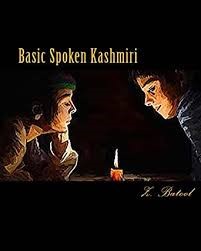Ravi Speaks:
 |
| Updated on 11.04.2022 |
My following article is already published on 26th Nov’2020 and is being reproduced again today especially at some of my friends’ request. I also feel that such articles should imbibe the feeling of maintaining and consolidating the base of our Kashmiri language which, unfortunately, is missing its spark, especially in the mega-cities. Where our elderly people originally from Kashmir also have not maintained talking in their mother-tongue at least at home.
“Children Can’t Speak In Their Mother-Tongue At Home”.
Yesterday while seeing the ‘Kaun-Banega-Crorepati’-on Sony-TV, one lady originally from Orissa who settled in Chhattisgarh namely Ms. Anup Riya Das won one Crore as the prize money. She was immediately connected to her parents on the sets through video calling and the scene was very emotional-when she did convey to her mother and father about winning such prize money in her mother tongue-Oriya. The intensity of emotional satisfaction between her and her parents was so high and touching that I suddenly realized the true value & impact of one’s interaction in his mother tongue.
Mother Tongue-Essential.
Knowing our mother tongue certainly allows us to understand and absorb our ancestral culture better. Language doesn’t just communicate a fact but an entire way of living and thinking. It teaches us our cultural history in such a subtle manner that most of us don’t even realize it. Of course, you should know your native language. There are some advantages. It gets you closer to your community when you go home. It gives you a sense of identity. It enables you to speak to your family members with a special affection when you are alone with them. When you are in a public place, and you need to say something in private to your family member or a person who is close to you and from your community, and when others are within earshot, you will be better off if you can speak in your native tongue. Never mind if you can’t give grand speeches or lectures on technical matters in your native language. But know enough to do basic communication. Mix words from major languages freely if you can’t do without it. It should not be an issue.
Mother Tongue-Essential.
Of course, there’s nothing morally, socially, or legally wrong in not knowing your “mother tongue-also”.
Now if a question is asked as to why one, who has been living due to circumstances or reasons beyond his control away from his native land-should not be knowing his mother tongue? Of course, to be honest, in this day and age, it isn’t a stigma anymore- not being able to speak your family’s original language-not like 30 or 40 years ago in my younger days. It shouldn’t surprise anyone that you can’t speak your family’s original language. Therefore, in a general view, it is not a bad thing for you to not speak your native tongue. People might even say-while one’s roots and ancestry are interesting to know about, it is not essential, in the sense that it is neither necessary for survival or success, nor would it make you a better person. But that is the people’s general view-as the saying goes-“Different folks, different strokes.”
21st Feb-International Mother Langauge Day.
Sometimes due to circumstances, one is deprived of the opportunities to know or learn one’s native language. What if you were born out of your hometown and were never exposed to the native language of your parents? Nowadays parents too might have separate native languages and they probably communicate in English or Hindi. Depending upon the place where they are settled. And if you are settled outside the country away from your parents-you can be excused for knowing neither and instead you give importance to learning the language spoken in the country or region you live in. That language gives you a wider reach than knowing your native language. But the question here is whether you need to be deeply connected with your roots or not. In case you need to remain connected you need to try learning your mother tongue also because that is the reflection of your basic ‘Cultural Heritage’ being strongly pursued.
Children Essentially MultiLingual Now.
Here children who have been born and brought up outside the native land would surely say- “We have neither seen Kashmir nor have adopted the Kashmiri language. We can understand the Kashmiri language but cannot speak mainly because our parents talk in Kashmiri between themselves.” Here the parents can induce the feeling of becoming a proud Kashmiri Pandit into their children and make them learn Kashmiri by creating a special affinity for the same in their minds. In my opinion, it is not at all bad. Some people put a great value in knowing their roots because they feel that it constitutes an integral part of their identity as people. I think, however, more than your roots, your values, your views and beliefs, and your actions define who you are.

Basic Mother Language Essential.
There are very heart-rending figures coming after the exile of almost three decades. The figure evaluation in the year 2002-3 showed the use of Kashmiri language as the spoken medium has fallen to a shocking 32 percent among children and grandchildren of the Pandit community in the past 12 years of exile outside our homes in Kashmir valley. The same must have fallen even drastically down after 2003 till date-since the figures for the latest evaluation are not gathered so far. If you take the case of grandchildren born after migration to Jammu and other places, hardly a few can speak in the Kashmiri language, most of them in Kashmiri Pandit migrant camps. There is another very disturbing observation that the disuse of mother the language was taking a fast track with five percent of disuse taking place every year and by the next six to seven years, there will be no conversation being done by Generation X in the language.
Bilingual Or Multilingual Ability.
I have not touched on the topic of another very important factor of inter-caste marriages happening amongst our children-which in a way is also accounting for the further dilution of our Kashmiri culture as well as the use of our mother tongue.
Mother Language To Be Saved.
When I take my case to be analysed-I realized that my children can understand the Kashmiri language very well but they cannot speak the same fluently. The reason as discussed in detail above-they have been brought up in Delhi and their whole life has been so far spent outside their native land. They have not been brought up in the so-called Kashmiri atmosphere where people would talk in Kashmiri and even follow their important festivities in their typical Kashmiri styles. Naturally, they are not to be blamed. Yes, we as the parents need to inculcate in them the feeling of being a proud Kashmiri and make them realize the importance as well as the strength of maintaining the cultural Heritage of our ‘Kashmiriyat’.
Curiosity To Speak Kashmiri

Some Kashmiri Common Words
I consider myself extremely fortunate for having learned my mother tongue well although I have been brought up outside my motherland since I left Kashmir in 1967. Thanks to my elders who maintained that Kashmiri atmosphere very strongly within our home in conversation and also in following our Kashmiri rituals etc.
But that’s just me. Now for me, it would be a challenge as to what extent I and my wife- who too is a strong Kashmiri- are successful in inculcating the strong value system and above all fluency in speaking our Kashmiri language within at least our family members at home.
=======================






